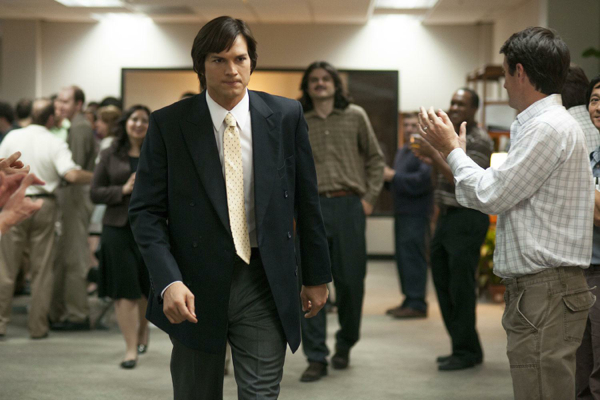Movie review by Greg Carlson
An embarrassing, half-baked product that stands in diametric opposition to the stamp of quality and user experience demanded of its subject on his company’s game-changing devices, “Jobs” is not the biopic Apple fanatics, or anyone else for that matter, wanted or needed. Director Joshua Michael Stern violates every law of competent filmmaking, stacking his movie with surface-level historical highlights instead of thoughtful ideas and explorations of what might drive and inspire a visionary person to innovate within a dynamic and highly competitive industry.
“Jobs” is so uninvolving, it could inspire a game in which participants tally the number of times the title character is shown barefoot, applauded by staff, nearly comes to tears, or breaks out a combination of the smirk/intense gaze. Ashton Kutcher’s passing resemblance to the younger version of the man (the actor is currently 35 and Steve Jobs died at 56 in October 2011) does not translate into a nuanced performance, and a portion of the blame belongs to screenwriter Matt Whiteley, who insists on giving Jobs a string of uninterrupted zero-to-sixty escalations from tranquility to rage. And Kutcher’s misguided exaggeration of Jobs’ ambling walk is just a bad joke.
If “Jobs” has a single redeeming feature, it can be described in the willingness of the filmmakers to remind viewers that Jobs could be selfish, savage, mercenary, and deluded. When told he is his own worst enemy, we are all inclined to believe it, since so many of the movie’s interactions are predicated on Jobs being a massive tool in matters of interpersonal communication. One gets the feeling that the nonstop loops of scenes exploring Jobs’ battles with Apple suits, his shabby and abusive treatment of employees, and his grotesque disloyalty to the people in his circle of closest friends are in the script to illustrate the man’s complexity and the burdens of genius, but the effect is cartoonish.
Stern and Whiteley eschew any close examination of Jobs’ personal life except in tiny glimpses when it suits their larger design. The movie hints that Jobs carried around a chip on his shoulder regarding his status as a child given up for adoption. Additionally, Jobs’ cruel rejection of his daughter Lisa (born 1978 to Chrisann Brennan) is minimized. Neither Brennan nor Laurene Powell are seen as significant in the life of Jobs, although Brennan (played by Ahna O’Reilly) has a small scene in which she is comforted by Daniel Kottke (Lukas Haas) after Jobs kicks her to the curb. It is certainly debatable whether the filmmakers’ decision to omit content dealing with the pancreatic cancer that would claim Jobs’ life was a wise decision.
Supposedly, Aaron Sorkin’s own script about Steve Jobs consists of only three scenes – each one playing out in real time prior to major Apple product launches – but if the writing is even a fraction as good as Sorkin’s work on the screenplay for “The Social Network,” the future movie would still be better than “Jobs.” In 1981, Bud Tribble coined the term “reality distortion field” as a means of accounting for the uncanny way in which Jobs could seduce himself and others into total belief in and commitment to an endeavor, especially when the odds against success were high. “Jobs” the movie so completely misses that charisma, the result is all Zune and no iPod.
